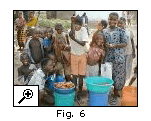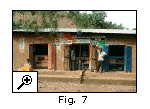|
|
 |
|
| |

The SESS teams have also found that many of the poorest experience difficulties in accessing alternative livelihoods. For instance, sewing is an important non-natural resource based income generating activity. However, many women, usually the poorest, are excluded from taking part in this alternative livelihood because they are unable to afford the investment in material required. Wealth is unevenly distributed: small shops selling drinks, cigarettes and household goods are often owned by the same prosperous households that own fishing gear. These wealthier households are usually the ones that are also involved in transport, trade and the cultivation of cash crops such as oil palms.

Diversification of local economies is one of the most effective ways of improving income-generating capabilities. Moreover non-natural resource-base activities and income generating activities are to be encouraged. This means shifting the current focus from exploiting natural resources towards manufacture, processing, trade and services. The SESS has recommended a number of interventions and alternative livelihood strategies including:
- improved processing of fish and cash crops such as palm oil,
- savings and micro-credit projects particularly for the poorest women to establish income generating activities that already have proved to be successful (baking, embroidery, beer brewing), and
- Improvements to physical assets such as transport accommodation, sanitation and education services.
The SESS suggests that initiatives should be developed, tested and introduced at village level in a participatory manner with key stakeholders and paying particular attention to the needs of all community members.
|
|